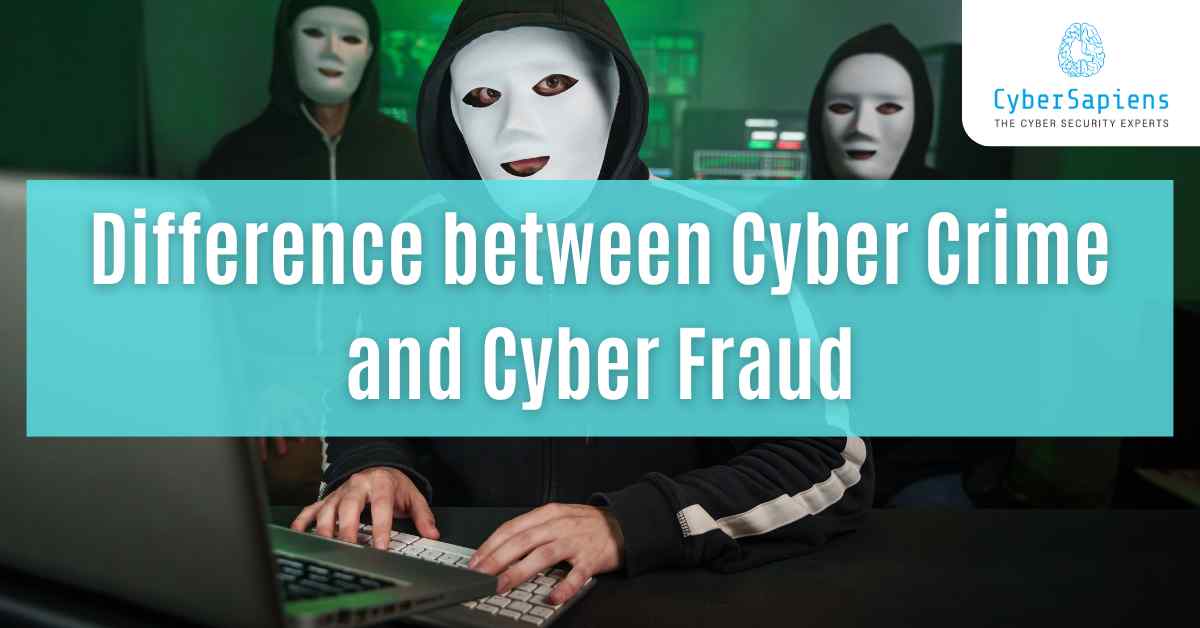For the current generation, the internet is one of the essential requirements when it comes to necessities. The rate at which technology is increasing is alarming and so are the windows created offering criminals a chance to execute heinous activities.
Cyber crime and cyber fraud represent fairly complex and intricate phenomena, which are, nevertheless, quite different from one another. In this article, the author will explain what constitutes cyber crime and cyber fraud and will differentiate between the two terms.
This article is going to be very interesting as well as knowledgeable with so much research we have pointed out the key difference between Cyber Crime and Cyber Fraud.
But before going into the main topic let’s understand what is Cyber Crime and Cyberfraud:
What is Cyber Crime?
Cyber crime here refers to any offence that is carried out via the use of a computer system or the internet. It embraces wide-spectrum illegitimate actions, which calendar hacking, identity theft, child pornography, cyber-bullying and malware distribution among others. Computer criminal activities can be directed at persons, enterprises, institutions, and other legal entities, where the consequences might entail money loss, damaged reputation, and psychological trauma.
Now let’s explore the 5 Types of Cyber Crime!
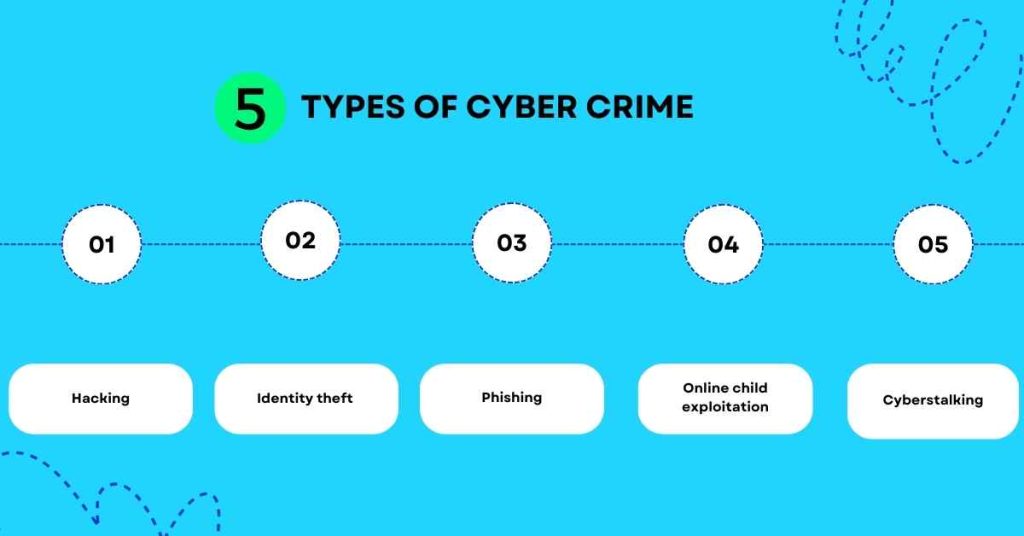
1. Hacking
Attacks on users, computer systems or networks to get unauthorized access with the aim of stealing information or paralyzing the networks’ functions.
2. Identity theft
To gain unauthorized access they take over identities, passwords, credit card numbers, social security numbers and other forms of individual identification.
3. Phishing
This is a form of fraud that involves creating fake email accounts or creating fake text messages or fake websites to deceive people and gain information from them.
4. Online child exploitation
Involved in the production, distribution or possession of sexual abuse material which includes child pornography, or involved in online sexual exploitation of children.
5. Cyberstalking
Cyberstalking is the act of employing the media particularly the internet to threaten or intimidate persons.
What is Cyber Fraud?
Cyber fraud is a subcategory of cyber crime that comprises criminal activities, which are facilitated by the use of the internet to defraud people or organizations of their cash or personal details. Cyber fraud refers to the act of cheating individuals and organizations through the use of a computer especially in conducting business through the internet.
Now let’s explore the 4 Types of Cyber Fraud!
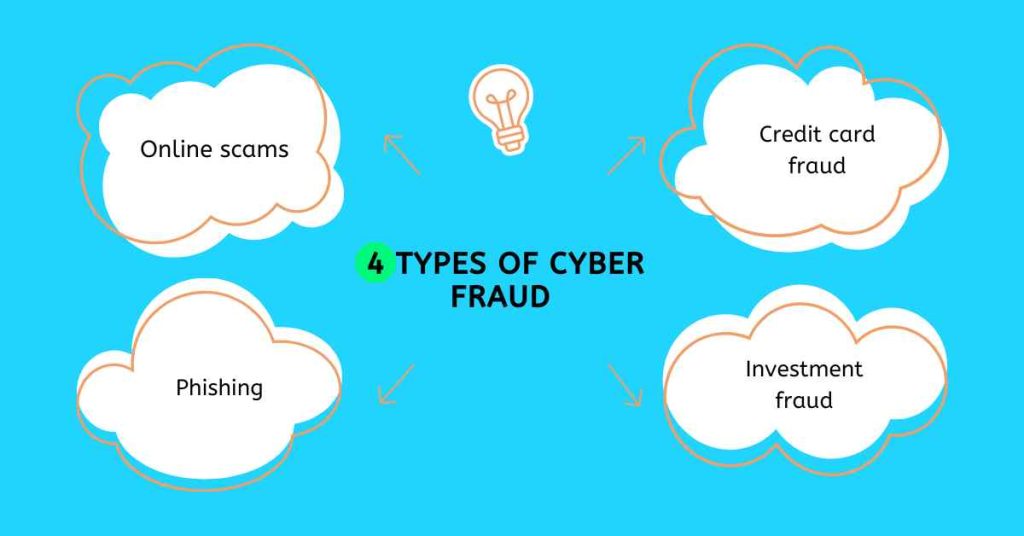
1. Online scams
Concerning the act of defrauding people through sending messages that mimic well-known companies, institutions, individuals or business organizations, creating false
websites to deceive people and get their money or information.
2. Phishing
This entails creating a fake email account, text message, or website with directions that will make the user, for example, enter their password or bank details.
3. Credit card fraud
As in purchasing goods and services and executing transactions through the help of a stolen credit card number.
4. Investment fraud
Frauding the investors by pretending to invest their money for considerably high risks or using the investors’ money for his or her benefit.
Cyber crime and cyber fraud are two different things despite the words having similar roots with ‘cyber’ in common.
Key Differences Between Cyber Crime and Cyber Fraud
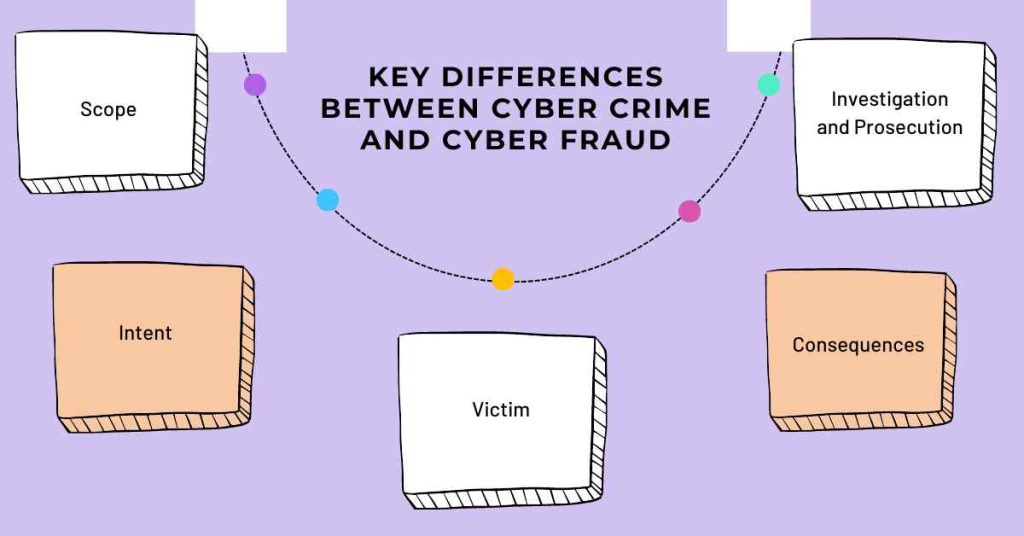
Here comes our main topic both cyber crime and cyber fraud involve illegal activities committed using the Internet, but there are key differences in it.
let’s explore the Key Differences Between Cyber Crime and Cyber Fraud:
1. Scope
Cyber Crime is a broader term that encompasses a wide range of illegal activities, including hacking, identity theft, and online harassment. Cyber fraud, on the other hand, is a specific type of cyber crime that involves financial deception or trickery.
2. Intent
Cyber Crime can be committed with varying intentions, such as financial gain, revenge, or political motivation.
Cyber fraud, however, is primarily committed for financial gain or to obtain sensitive information.
3. Victim
Cyber Crime can affect individuals, businesses, organizations, or governments.
Cyber fraud, while potentially affecting all of these entities, tends to target individuals and businesses.
4. Consequences
Cyber Crime can result in a range of consequences, including financial losses, reputational damage, and emotional distress. Cyber fraud, in addition to financial losses, can also result in damage to one’s credit score, identity theft, and legal consequences.
5. Investigation and Prosecution
Cyber Crime investigations often involve law enforcement agencies, such as the FBI in the United States.
Cyber fraud investigations may involve financial regulatory agencies, such as the Securities and Exchange Commission (SEC), in addition to law enforcement agencies.
Why You Should Know The Difference Between Cyber Crime and Cyber Fraud?
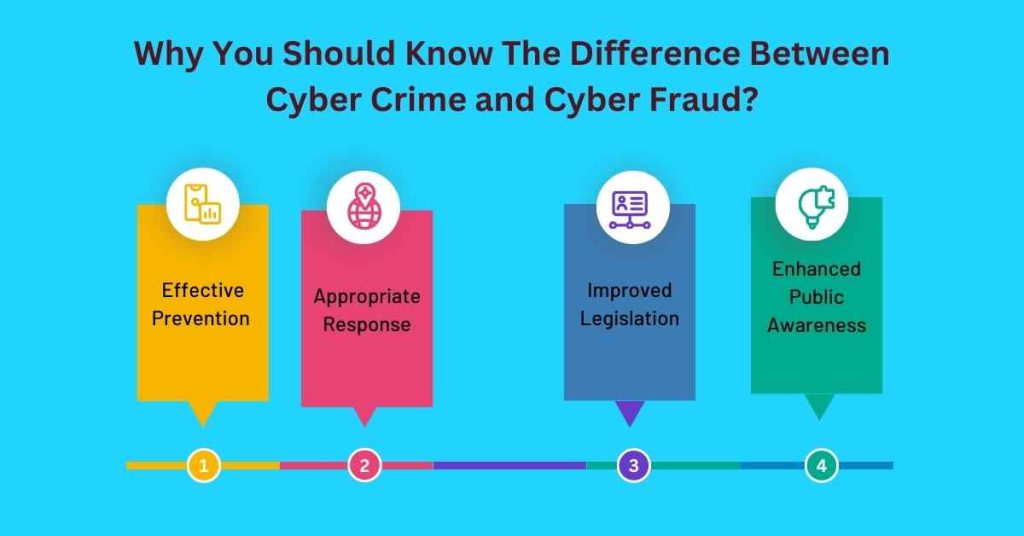
Now here comes the big doubt in our mind it is okay to know the difference between cyber crime and cyber fraud, but why you should know about this, what are the benefits here are the reasons:
1. Effective Prevention
It is possible to understand the warning signs of the particular types of cyber crimes or cyber fraud and therefore find proper protection from them.
2. Appropriate Response
Knowing the particular kind of cyber crime or cyber fraud can help in addressing it properly; in coordination with the proper agencies and undertaking proper legal steps if needed.
3. Improved Legislation
Thus, the distinction between cyber crime and cyber fraud can be useful in the creation of more appropriate legislation and policies to fight these crimes.
4. Enhanced Public Awareness
This is how carrying out a comparative analysis of the two concepts of cyber crime and cyber fraud would help raise the awareness of the public so that they can curb incidences of crimes.
For a deeper understanding of cyber-related topics, check out our previous Blog about the comparison of differences between cyber security and cyber crime. This will help you to improve your ability to protect against digital threats.
Conclusion
In conclusion, cyber crime and cyber fraud are two separate concepts; they have different, aims, and impacts. It is essential to distinguish between these two terms for prevention, response, and legislation. Understanding the differences between cyber crime and cyber fraud helps in eradicating them to enhance the security of individuals, companies, and governments.
FAQs: Difference between Cyber Crime and Cyber Fraud
1. What’s the main difference between cyber crime and cyber fraud?
Ans: Cyber crime is a broad term encompassing any illegal activity using computers or networks. Cyber fraud, on the other hand, is a specific type of cyber crime focused on financial gain through deception.
2. Can cyber crime happen without fraud?
Ans: Absolutely. Cyber crime can target data theft, disrupting operations, or causing damage. Hacking a government database or launching a DoS attack are examples of non-financial cyber crimes.
3. Is all cyber fraud done online?
Ans: While most cyber fraud occurs online, phone scams and manipulating ATMs can also be considered cyber fraud if they utilize technology to deceive victims.
4. Are individuals the only targets of cyber crime?
Ans: No way! Businesses, organizations, and even critical infrastructure like power grids can all be targets of cyber crime.
5. What are some common social engineering tactics used in cyber fraud?
Ans: Phishing emails that mimic legitimate institutions, creating a sense of urgency or fear, and impersonating authority figures are all tactics used to manipulate victims.
6. What are some ways to identify a phishing attempt?
Ans: Poor grammar, generic greetings, misspelled domain names, and requests for personal information are red flags. Don’t click on links or attachments in suspicious emails.
7. What should I do if I suspect I’ve been a victim of cyber fraud?
Ans: Act immediately! Contact your bank or financial institution, change your passwords, and report the incident to the authorities and relevant online platforms.
8. How can I create strong passwords?
Ans: Use a combination of upper and lowercase letters, numbers, and symbols. Avoid using personal information like birthdays or names. Don’t reuse passwords across different accounts.
9. What’s the best way to protect myself from cyber threats?
Ans: Stay informed about common scams, maintain strong passwords, and be cautious with unsolicited messages. Update your software regularly and report suspicious activity.
10. Where can I learn more about cyber security best practices?
Ans: Government websites, reputable security companies, and non-profit organizations offer resources and educational materials on cyber security.


